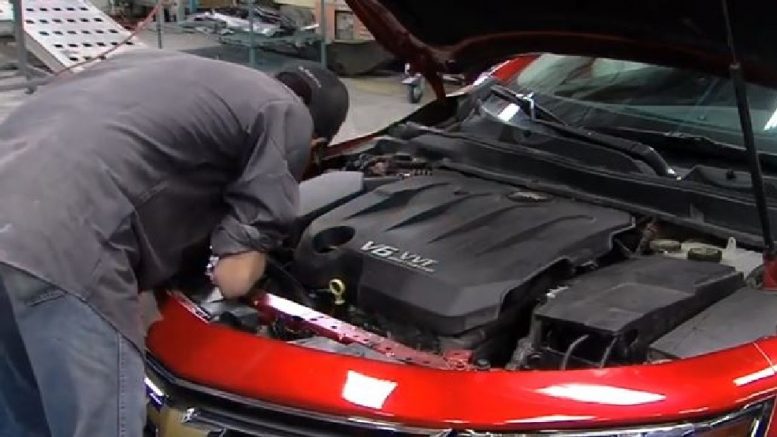(KUTV) At Valet Auto Body in Sandy, Utah, owner Trace Coccimaglio shows off a red, 2014 Chevrolet Impala that his guys just finished repairing.
You’d never know it was recently in a wreck so rough that the entire front end needed to be replaced, including several sections of the bumper’s frame.
The owner’s insurance company said they would not pay to repair the car with parts manufactured by Chevrolet, the maker of the car. Rather, they wanted the Impala repaired with after-market parts — parts made by some other company that try to mimic original parts. But Coccimaglio says the parts have noticeable differences.
Coccimaglio showed Get Gephardt the differences side by side, which he says could have major safety consequences — like delayed airbag deployment.
“The safety of a vehicle comes down to milliseconds,” Coccimaglio said.
Car makers agree. Honda put out this video demonstrating how the computer system in their cars react when a car is in a crash.
In what they said was an independent test, Honda showed crash test results between a car repaired with factory manufactured parts and one repaired with after-market parts. The airbag deployed seven milliseconds later in the after-market parts car.
On paper, Coccimaglio said it’s clear why insurance companies want to use aftermarket parts — it’s a major money saver.
“They’re saving 60, 70 percent,” he said.
Frustrated by insurance companies mandating what parts they will pay for repairing cars, hundreds of auto repair shops from around the country have teamed up and have hired former Utah attorney general Mark Shurtleff to sue insurance companies in federal court.
Shurtleff said auto body shops who refuse to play ball with an insurance company’s mandates, often fearing it would be unsafe to do so, find themselves punished with insurance companies steering future customers away.
“Automobile owners, who pay a lot of money for insurance, are being put at risk because of this,” Shurtleff said.
But Michael Barry from the non-profit Insurance Information Institute says parts shouldn’t be declared unsafe just because they weren’t made by the original car-maker.
“The auto insurance industry has a vested interest in returning a safe vehicle to the roadways because they continue to insure the vehicle and it occupants,” Barry said.
Barry said insurance companies often aren’t inflexible when it’s a matter of safety, but when they are, he said drivers and auto body shops are free to do whatever repairs they want — as long as they’re willing to pay the difference.
“If an auto body repair shop believes that an unsafe vehicle is being put on the roads, they have every reason to raise their hands and tell the auto insurer and the policy holder that they’re unwilling to do it,” Barry said. “I must say, they’re rare occasions. But there are occasions where the auto repair shop says, ‘We’re not putting that in.’”
As for Coccimaglio, he repaired that Impala at a loss to himself because he felt it was the safe and ethical thing to do, even after the driver’s insurance company, Farmers, refused to pay for the factory manufactured parts.
“There’s an expectation on us to do a proper repair that’s safe,” he said.
Get Gephardt reached out to Farmers to ask if they wanted to comment for the story. A spokesperson responded, “What occurred is not consistent with our expectations or practices.”
Adding, “We have reminded all employees on proper estimating procedures.”
Just like that, Farmers reimbursed Coccimaglio for the difference in the price of the parts.
Source: kutv.com





Be the first to comment on "Insurance Companies Contribute to Less-Than-Safe Repairs, Lawsuit Says"